After a lengthy debate, the state House of Representatives voted late Wednesday to approve a series of budget cuts proposed by Republicans to balance the state budget, but the spending plan still needs approval from the Senate, which is scheduled to reconvene on Thursday.
The House voted 36-32 to approve an amended version of Senate Bill 9 to cut higher education spending and went beyond the Senate’s proposed budget cuts for the Department of Health and Department of Cultural Affairs.
The clash Wednesday night pointed to an ideological impasse. Throughout the special session of the New Mexico Legislature that began Friday, Democrats have refused to back any plan that does not include boosting revenue. However, House Republicans have kept to a party line that rejects any changes in tax policy.
Republicans offered their proposal as an amendment to a bill passed by the Senate on the session’s first day.
House Republican leaders characterized their plan as including only minor changes, such as exempting the Department of Public Safety as well as the Children, Youth and Families Department from the budget ax.
But the compromise, some legislators in both parties said, will not be enough to address the state’s financial shortfall. Lawmakers might face the prospect of having to cut even further later in the budget year, which ends in June 2017.
“We’re going to be having this same conversation in January because I don’t think we’re done,” Rep. Antonio “Moe” Maestas, D-Albuquerque, told the House.
The budget cuts passed by the Senate called for slashing higher education funding by 5 percent. House Republicans said on Monday they would seek to cut even deeper into the budgets of the state’s universities, reducing spending by 6 percent at all institutions of higher education except for the University of New Mexico, which would be cut 8 percent. However, Democrats in both the House and Senate balked at the plan. And when the House convened Wednesday, Republicans appeared to step back slightly from their proposal by calling for a cut of 5.5 percent to higher education funding, including to UNM.
The half-percent proved a point of contention Wednesday, however, and Republicans eventually returned to the Senate’s original proposal.
“Gridlock cannot prevail here because if it does, government shuts down,” said House Majority Leader Nate Gentry, R-Albuquerque.
But if Republicans were offering a compromise, many Democrats did not see it that way.
The House Republican amendment ultimately did not cut as deeply as an outline offered by the party’s leaders on Monday and dialed down cuts to public elementary and high schools. And the House Republican plan exempts the Children, Youth and Families Department as well as the Department of Public Safety. The Senate voted to cut funding for both agencies by $1.5 million and $1.8 million, respectively. The House dialed down cuts to public education, too.
The series of budget cuts passed by the House, however, cuts deeper into funding for the Department of Health and Department of Cultural Affairs.
Democrats railed against the proposed cuts to the Department of Health. While the Senate plan would slash by $2.1 million, the House plan would cut an additional $2.6 million.
The Senate passed a measure to hold off on implementing a package of corporate tax cuts. But Republicans on the House Ways and Means Committee rebuffed the plan, prompting Democrats to lambaste the proposed budget cuts as unfair.
“We continue to hollow out New Mexico, which this bill does, while we try to protect a few at the top and a trickle-down economic policy,” Rep. Bill McCamley, D-Las Cruces, told the House.
Senior lawmakers, meanwhile, said the House Republican proposal will not do enough to bridge a gap in the state’s budget, even for the current fiscal year, which ends at the end of June 2017.
Sen. John Arthur Smith, D-Deming, said legislators will likely have to make even more changes to the state’s budget when they reconvene for a regularly scheduled 60-day session in January.
The House plan will further deplete the state’s reserves, down to about 1 percent, Smith said.
And he does not expect the state’s revenues to improve during the next three months as the energy markets remain volatile.
“Our revenues are still heading south,” Smith said.
Contact Andrew Oxford at 575-986-3093 or aoxford@sfnewmexican.com. Follow him on Twitter at @andrewboxford.


